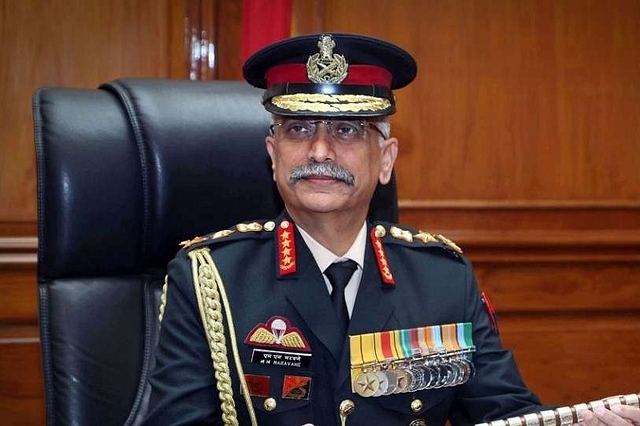
Indian Army Chief Naravane’s Upcoming Nepal Visit To Strengthen Defence Cooperation: Indian Embassy
Indian Army Chief General Manoj Mukund Naravane's upcoming visit to Nepal is focused on strengthening the defence ties between the two neighbouring countries, the Indian Embassy in Kathmandu has said.
At the invitation of his Nepali counterpart General Purna Chandra Thapa, General Naravane will arrive in the Himalayan nation on a three-day official visit on Wednesday.
Replying to several media queries, Embassy spokesperson Naveen Kumar said that the upcoming visit would deepen the long-standing and customary bonds of friendship between the two
Armies.
His visit will provide an opportunity for both sides to discuss the bilateral defence partnership and explore avenues to further strengthen it for mutual benefit.
During the visit, according to the Nepali sources, General Naravane might announce some military support to Nepal, especially to some hospitals coping with the Covid-19 pandemic.
The main events in his program include paying homage at the martyr's memorial in the Army Pavilion, receiving a guard of honour in the Army Headquarters, holding an official meeting with his General Thapa and address student officers at the Army Command and Staff College in Shivapuri near Kathmandu.
The top highlight of the visit will be the conferment of the rank of an honorary General of the Nepali Army to General Naravane by President Bidhya Devi Bhandari on Thursday amidst a special ceremony, according to an official statement.
Nepal and India have a historic tradition of conferring the honorary title to each other's army chief since 1950.
General Naravane will be the senior-most Indian official to visit Nepal following the countries' boundary dispute since last November after placing disputed territories in its new political map.
At a time when Nepal-India ties has reached an all time low due to the dispute, General Naravane added a twist in May after India opened a new track linking the Mansarover to the state of Uttarakhand.
Nepal protested the opening of the new track by India because the newly constructed road surpasses a tri-juncture between Nepal, India and China.
The Indian road surpasses Lipulekh, that Nepal claims its own territory over which it had protested earlier in 2015 during an agreement between New Delhi and Beijing.
After Nepal's protest over the new road constructed by India followed by the dispute in Kalapani area which is an unsettled boundary row since decades, General Naravane had said that it was in fact China that was creating a flashpoint between Delhi and Kathmandu.
"I don't know what they are actually agitating about. There is a reason to believe that they might have raised this problem at the behest of someone else and that is very much a possibility," Naravane had said at an online conference in May.
His statement had created huge uproar in Kathmandu.
Many officials believed that thee statement was one of the major reasons behind Kathmandu's decision to release the new map on May 20 incorporating Kalapani, Lipulekh and Limpiyadhura which is currently occupied by India.
This news has been published via Syndicate feed. Only the headline is changed.